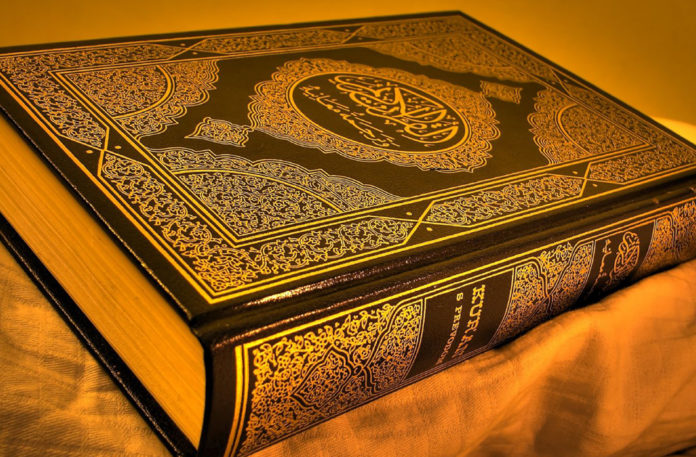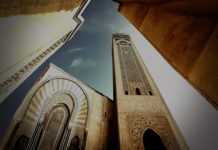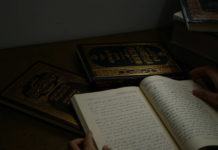Allah ta’ala blessed my wife and i with the opportunity to live in Madinah for 6 years. In the final year, during exam week, I came home from an exhausting 6 hours of exams and entered the apartment. My wife came in from our Muslim Bulgarian neighbors and said, “I have sad news.” I saw in her face like her father had died. And I said, “What? What happened? Did your parents die?” She said, “No, Shaykh Bin Baz died today!”
I have never cried for the death of a family member more than I cried for Shaykh Bin Baz – Rahimahullah. He passed away on Thursday, and on Friday every Masjid in Saudi Arabia (thousands of Khateebs) gave their 1st Khutbah on the high status of the Uluma’ and the 2nd khutbah on the life of Shaykh bin Baz.
I remember in Masjid Quba’ in Madinah Munawarrah, it was one of the longest khutbahs that Shaykh Ismail gave. When he got to the 2nd Khutbah, and announced the death of…he started crying when he said, “Our beloved father..shaykh Abdul Aziz bin baz …” There was not a dry eye in the entire Masjid of over 4000 people.
At home my wife had recorded the Khutbah at the Ka’bah, and listening to it later, the Imam of the Ka’bah had choked with tears when he said, “Our beloved father … Shaykh Abdul Aziz bin Baz..”
After the Khutbah, shaykh Bin Baz’s Janaazah prayer was done at the Ka’bah. The radio announcer, who had so many times in the past done open Fiqh radio sessions with the shaykh, could not control himself on the radio, and you could not understand what he was saying because of his tears.
I saw at University, although it was final exam week, a student had written a Qaseedah (long arabic poem) about the Shaykh. It was interesting that all these students would put aside their exams to express their feelings.
Basic Problem: There is a need, a thirst, for knowledge but when the announcement is given that the water is here, we don’t find our community driving to that water source. In sha Allah, today I want to speak a little about the importance of seeking knowledge and why it is a must for us.
Say: Believe in it or do not believe. Indeed, those who were given knowledge before it – when it is recited to them, they fall upon their faces in prostration. And they say, “Exalted is our Lord! Indeed, the promise of our Lord has been fulfilled.” And they fall upon their faces weeping, and it (the Qur’an) increases them in humble submission. Surah Isra’ 17: 107-109 |
| “Seeking knowledge is Fard (Compulsory, not an option) upon every single Muslim.” |
Many aspects of knowledge are Fard on every single Muslim. While others are Fard Kifaa’ee, if a portion of the community fulfills the need then the sin is absolved off the community, otherwise the entire community is sinful.
Ibn Al-Jawzee in his book Miftaah Daar as-Sa’aadah explains those aspects of knowledge which are Fard. He mentions five:
One: Usool al-Iman al-Khamsah
Two: Knowledge of the law of Islam, what is Fard is that which is Fard upon a person to perform: Such as Wudu, Salah, Siyaam, Hajj, Zakah, that which relates to it, each it’s conditions and what negates the action.
Three: Knowledge of the Haram which all the prophets and laws and divine books agreed upon, as mentioned in verse 32 of Al-Araaf.
Four: Knowledge of the rules that govern human interaction, specifically (such as with one’s spouse or children) and generally (like with general people). The Fard knowledge of this section differs in accordance with people’s situations and responsibilities.
They were not satisfied with what they knew:
Ibn Al-Jowzee said,
| “Let me tell you about my own situation. I am never content, saying to myself that I have read enough books. If I find a book which I haven’t seen before, it is as if I have stumbled upon a pot of Gold.” |
Dear brothers and sisters, it could be our very sins that hold us back from seeking this path of knowledge of what Allah and His Messenger are telling us:
Statement of Ibn Mas’ood:
| I think that a person could forget the knowledge that he’s learnt because of his sin. |
In the book: Tabaqaat Al-Hanafiyyah 2/487:
And when Abu Haneefah had a question that he could not figure out, he would say to his students, “This forgetfulness is due to nothing other then a sin I have committed.” So he would ask Allah ta’ala for forgiveness, or he might get up and pray, hoping that Allah would forgive him. Then when the issue would become clear to him, he would become happy and say, “It is my good news that perhaps Allah has forgiven me.”
This was told to Al-Fudayl ibn Iyaad and he began to weep and commented, “This is because of the upright life that he lives. As for others, they would not realize this.”
They would spend their money in seeking this knowledge, it was not free:
Statement of Ali ibn ‘Aasim page 177:
The scholar “Alee ibn Aasim” said,
| “(When I was young) My father gave me 100 thousand dirhams and said, ‘Go, and do not come back until you have accumulated 100 thousand hadiths.” |
They would ignite in happiness when they would learn something new:
From Al-Bidaayah wan-Nihaayah: Abu Ja’far Muhammad ibn Ahmad An-Nasafee went to sleep one night in sadness and depression due to the poverty and need and the debts that he owed. As he sat there, an issue of Fiqh which had caught him came to his mind and suddenly he knew the solution to it. So he jumped up in the middle of the darkness cheering and shouting “Ayn Al-Mulook!!” She asked him, what happened? He told her of the issue he just realized. And she was shocked, all this happiness even though they were in the state they were in.It took Abu Ubaid Qaasim ibn Salaam 40 years to write his book Ghareeb Al-Hadeeth. In explaining the days when he was writing the book, he says: Perhaps – while listening to some scholars – I may benefit one point from what they said and then hurry home to write it in the proper chapter of the book. After that I would spend the entire night with a grin on my face, in utter happiness because of that point I just benefited.
* Nawawee didn’t have the knowledge just evaporate into his head. Imam Nawawee’s story on page 81 as a quote/ the classes he took.
In his schooling days, he used to attend 12 Halaqahs or classes every day.
Story of past: Baqee ibn Mikhlad al-Andalusee page 74 in Siyar A’laam an-Nubulaa’
– walked from Al-Andalus by foot to Iraq in the year 221
– near Iraq: “I heard of what had happened to Imam Ahmad, how he had been forbidden from giving classes.
– Extremely sad
– met him, told him I was from Al-Maghrib al-Aqsa – Afreeqiyyah? – no further.
– He told him to pretend he was a beggar and come to his house every night. I’ll tell you a hadith or two. But don’t come to any public classes or hang out with students of knowledge.
– In those weeks Baqee gathered and learned over 300 hadith.
– AlKhaleefah alMutawakkil saved imam ahmad, and then he would make room for me in the halaqah and say: This is the definition of a true student of knowledge, and then he would tell them my story.
Part 2:
Lazyboy:
An icon of our lifestyle. We are mesmerized with entertainment, shows and games and amusement parks. In Makkah, there was an entertainment place and the people correctly translated: Naadee at-Tarfeeh as Distraction club instead of amusement.
What excuse will we have when the reason we did not learn the deen and pass it on to our next generation is that we were too busy watching tv? Or that we were engrossed in games? Is that why we were created?
The fight with Shaytaan
| Iblees said, “By your might, I will surely mislead them all . Except, among them, your chosen servants. Surah Saad 38/82-83 |
It’s a fact Shaytaan want’s to mislead us all – away from Islam, away from knowledge of the Deen.
Let me tell you about three of his greatest weapons:
One: Sowfa (intresting it’s not a Lazyboy) I’ll do it tomorrow – until he finally says, ‘if I could do it all again I would have taken the path of knowledge.’
Two: Making a person think that he’ll study sometime in the future. In the summer, after University, after I get married, after I have a million dollars, a wife that loves me, and 10 beautiful kids After I’m dead.
Three: That one’s life is not upright and they are not worthy of studying.
It is the knowledge that will make us all straight. It is the one who knows Allah that fears Him. You say: Ok, I’m going to sign up for Islamic classes, but what’s in it for me?
1. Know that there is paramount reward from Allah ta’ala for those who seek knowledge sincerely for His sake and pass it on to others.
2. Know that the knowledge you pass on, you will receive reward from it even after you are dead, the reward lives on.
3. Know that this knowledge is the inheritance from the Prophets. Go and take your share.
4. Know that you will bask in happiness when the cloud of ignorance is raised from our heads
(NOTE: If you want to build a strong and powerful relationship with Allah, check out Islamia TV, where you can watch Islamic speakers from across the globe deliver inspiring and motivational courses. Learn more at www.islamia.tv.)

SUBSCRIBE AND LEARN...
- Fresh articles
- Increase your Islamic knowledge
- Build a Powerful Connection with Allah





















